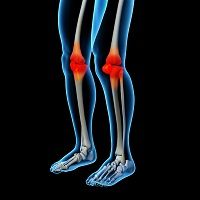Article
Painful Knee Osteoarthritis Suggests Early Mortality in Women
Author(s):
The pain that typically accompanies osteoarthritis may be associated with excess mortality among middle-aged women, British scientists reported.

The pain that typically accompanies osteoarthritis may be associated with excess mortality among middle-aged women, British scientists reported.
Lead Author Stefan Kluzek, MRCP, DipSEM, MSc, and colleagues compared the mortality rate of women who had painful knee or hand osteoarthritis to those without the disease.The team acquired data that suggests that there is a correlation between knee pain and cardiovascular issues.
The study, presented at the World Congress on Osteoporosis, Osteoarthritis and Musculoskeletal Diseases on March 28, was based on information from the Chingford Study. The authors followed the middle-aged women for 24 years in order to find a link between knee and hand pain (with or without radiographic osteoarthritis) and early overall and disease caused mortality.
“Knee and hand symptoms, radiographic changes, majority of known cardiovascular risk factors and overall, cardiovascular, and cancer-related mortality were assessed based on study follow-up in 2014 and data from all available death certificates at this point,” the authors wrote.
With the average follow-up being 22 years, it was found that there was an almost 2-fold increase risk of overall mortality for women with knee pain and radiographic osteoarthritis when compared to those without either. The cardiovascular mortality risk came in at an over 3-fold increase.
The researchers found no connection between hand osteoarthritis and excess mortality risk.
"These findings suggest that any self-reported knee pain in osteoarthritis, as opposed to hand pain, seems to be a crucial factor leading to early cardiovascular mortality and is likely to be linked with decreased mobility,” Kluzek said in a news release.
It was concluded that women with painful knee osteoarthritis had a higher risk of early death.
“Radiographic osteoarthritis without pain is not affecting long-term mortality,” Kluzek said. “More research is needed to understand how people adapt to knee pain, and how this leads to cardiovascular impairment."


